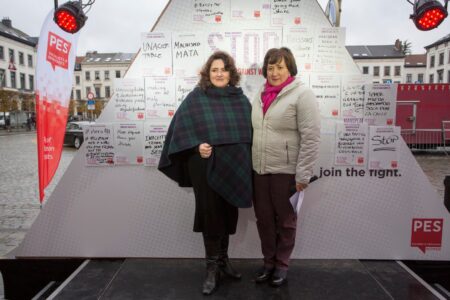Thanks to the engagements of previous EU Council Presidencies Malta and Estonia, the EU was able to make a historic step forward in terms of combating violence against women by signing the Istanbul Convention in 2017.
It is thus with regret that PES gender equality ministers and state secretaries observe the withdrawal of the Bulgarian and Slovakian Governments from their engagement in ratifying the Istanbul Convention. Not ratifying the Convention is turning a blind eye to all women victims of violence and failing to protect and support women. One woman in three across the EU has been victim of physical or sexual violence since the age of 15. We cannot accept these figures.
PES gender equality ministers and state secretaries gathering at the UN Summit on Gender Equality in New York thus call on the Bulgarian EU Council Presidency and EU member states to ratify the Istanbul Convention as soon possible. The EU has been the frontrunner and an example on gender equality and women’s rights across the world. In the framework of the UN 2030 agenda, the EU has a commitment to achieve true gender equality (‘making the planet 50/50’). Instruments such as the Istanbul Convention and an EU Gender Equality Strategy are therefore key.
List of Signatories
- Lydia Mutsch, Minister for Health and for Equal Opportunities (Luxembourg)
- Helena Dalli, Minister for European Affairs and Equality (Malta)
- Pernilla Baralt, State Secretary for Children, Elderly and Gender Equality (Sweden)
- Elke Ferner, State Secretary for Gender, Family, Elderly and Youth (Germany)
- Martina Vuk, State Secretary for Labour, Family, Social Affairs and Equal Opportunities (Slovenia)
- Rosa Monteiro, State Secretary for Citizenship and Equality (Portugal)
Background
The Istanbul Convention aims to prevent violence against women, protect victims of violence and prosecute the perpetrators regardless of their place of origin. In other words, the Convention recognises violence against women across Europe equally and as a human rights violation.
The Istanbul Convention covers many different, interrelated and overlapping forms of violence against women such as: domestic violence, sexual violence including rape, human trafficking, female genital mutilation, physical violence, sexual harassment, forced marriage, honour crimes, psychological violence including stalking and verbal abuse in public places.
- One in three women in the EU has been a victim of physical and/or sexual violence since the age of 15
- One in 20 women have been raped
- Over half (55%) of women have experienced sexual harassment
- One in three women has experienced psychological abusive behaviour by a partner
- One in three women has experienced physical or sexual violence by an adult during childhood.
So far, all EU Member States have signed this text but only 16 of them have ratified it (Austria, Belgium, Cyprus, Denmark, Finland, France, Germany, Italy, Malta, Netherlands, Poland, Portugal, Romania, Slovenia, Spain and Sweden). At the Council of Europe, 28 countries ratified[1] the convention; 18 more have signed it and are currently in a process of ratification.
[1] http://www.coe.int/en/web/conventions/full-list/-/conventions/treaty/210/signatures



